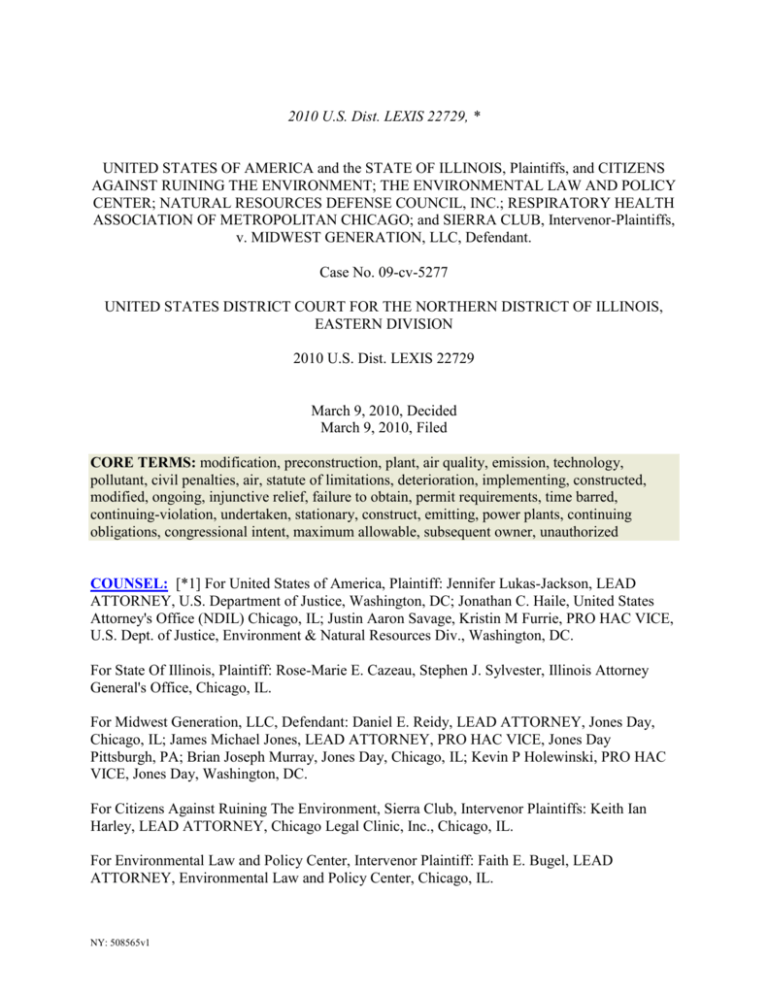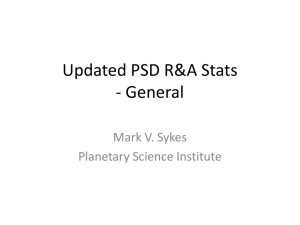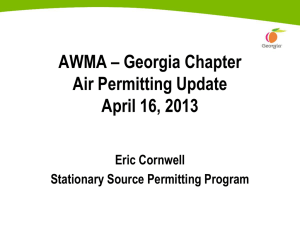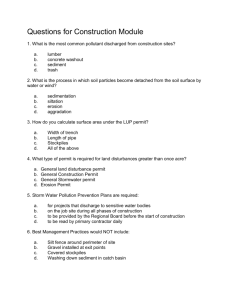
2010 U.S. Dist. LEXIS 22729, *
UNITED STATES OF AMERICA and the STATE OF ILLINOIS, Plaintiffs, and CITIZENS
AGAINST RUINING THE ENVIRONMENT; THE ENVIRONMENTAL LAW AND POLICY
CENTER; NATURAL RESOURCES DEFENSE COUNCIL, INC.; RESPIRATORY HEALTH
ASSOCIATION OF METROPOLITAN CHICAGO; and SIERRA CLUB, Intervenor-Plaintiffs,
v. MIDWEST GENERATION, LLC, Defendant.
Case No. 09-cv-5277
UNITED STATES DISTRICT COURT FOR THE NORTHERN DISTRICT OF ILLINOIS,
EASTERN DIVISION
2010 U.S. Dist. LEXIS 22729
March 9, 2010, Decided
March 9, 2010, Filed
CORE TERMS: modification, preconstruction, plant, air quality, emission, technology,
pollutant, civil penalties, air, statute of limitations, deterioration, implementing, constructed,
modified, ongoing, injunctive relief, failure to obtain, permit requirements, time barred,
continuing-violation, undertaken, stationary, construct, emitting, power plants, continuing
obligations, congressional intent, maximum allowable, subsequent owner, unauthorized
COUNSEL: [*1] For United States of America, Plaintiff: Jennifer Lukas-Jackson, LEAD
ATTORNEY, U.S. Department of Justice, Washington, DC; Jonathan C. Haile, United States
Attorney's Office (NDIL) Chicago, IL; Justin Aaron Savage, Kristin M Furrie, PRO HAC VICE,
U.S. Dept. of Justice, Environment & Natural Resources Div., Washington, DC.
For State Of Illinois, Plaintiff: Rose-Marie E. Cazeau, Stephen J. Sylvester, Illinois Attorney
General's Office, Chicago, IL.
For Midwest Generation, LLC, Defendant: Daniel E. Reidy, LEAD ATTORNEY, Jones Day,
Chicago, IL; James Michael Jones, LEAD ATTORNEY, PRO HAC VICE, Jones Day
Pittsburgh, PA; Brian Joseph Murray, Jones Day, Chicago, IL; Kevin P Holewinski, PRO HAC
VICE, Jones Day, Washington, DC.
For Citizens Against Ruining The Environment, Sierra Club, Intervenor Plaintiffs: Keith Ian
Harley, LEAD ATTORNEY, Chicago Legal Clinic, Inc., Chicago, IL.
For Environmental Law and Policy Center, Intervenor Plaintiff: Faith E. Bugel, LEAD
ATTORNEY, Environmental Law and Policy Center, Chicago, IL.
NY: 508565v1
For Natural Resources Defense Council, Intervenor Plaintiff: Shannon Wanzer Fisk, LEAD
ATTORNEY, Natural Resources Defense Council, Chicago, IL.
For Respiratory Health Association [*2] of Metropolitan Chicago, Intervenor Plaintiff: Michael
Christopher Soules, LEAD ATTORNEY, PRO HAC VICE, Environmental Law & Policy
Center, Minneapolis, MN.
JUDGES: JOHN W. DARRAH , United States District Court Judge.
OPINION BY: JOHN W. DARRAH
OPINION
MEMORANDUM OPINION AND ORDER
Plaintiffs, the United States of America and the State of Illinois, brought this action against
Midwest Generation, LLC ("Midwest Generation"), seeking injunctive relief and civil penalties
under the Clean Air Act ("CAA"), 42 U.S.C. § 7401 et seq. Among other things, Plaintiffs
allege that Midwest Generation is operating six coal-fired power plants in violation of certain
CAA provisions for the prevention of significant deterioration ("PSD"). Midwest Generation
moves to dismiss all PSD counts for failure to state a claim for relief.
1
FOOTNOTES
1
On January 19, 2010, the following "Citizen Groups" were granted leave to intervene:
Citizens Against Ruining the Environment; the Environmental Law and Policy Center; the
Natural Resources Defense Council, Inc.; Respiratory Health Association of Metropolitan
Chicago; and the Sierra Club. The instant Motion to Dismiss did not address the Intervenors'
claims.
BACKGROUND
Unless otherwise indicated, the following [*3] facts are taken from the allegations in the
Complaint and are accepted as true for purposes of deciding this Motion to Dismiss. Midwest
Generation owns and operates electricity-generating facilities, including six coal-fired power
plants in Illinois. (Compl. P 2.) Midwest Generation purchased the plants from the
Commonwealth Edison Company ("ComEd") in 1999. (Compl. P 2.) Before the sale, ComEd
had modified each of the six plants and subsequently operated them without first obtaining
appropriate preconstruction permits required by the CAA. (Compl. P 2.) ComEd also failed to
NY: 508565v1
install and employ the "best available control technology" to control emissions of nitrogen
oxides, sulfur dioxide, and particulate matter as required by the CAA. (Compl. P 2.)
After purchasing the six plants from ComEd, Midwest Generation separately modified one of the
plants (Will County) and continued to operate all six plants without obtaining any
preconstruction permits. (Compl. P 2.) As a result of ComEd's operation of these unauthorized
modifications, massive amounts of pollutants have been, and continue to be, released into the
atmosphere. (Compl. P 3.)
The CAA is designed "to protect and enhance the quality [*4] of the Nation's air, so as to
promote the public health and welfare and the productive capacity of its population." 42 U.S.C. §
7401 (b)(1). The CAA requires the Administrator of the Environmental Protection Agency
("EPA") to promulgate regulations for national ambient air quality standards ("NAAQS") for
certain pollutants. 42 U.S.C. § 7409. Each state is then required to designate those areas within
its boundaries where the air quality is better or worse than the NAAQS for each pollutant or
where the air quality cannot be classified due to insufficient data. 42 U.S.C. § 7407(d).
The CAA sets forth PSD requirements in designated "attainment" or "nonclassifiable" areas. See
42 U.S.C. § 7470-7492. Each state is required to adopt and submit to the EPA for approval a
State Implementation Plan ("SIP") that includes, among other things, regulations to prevent the
significant deterioration of air quality under the CAA. 42 U.S.C. § 7410. If a state does not have
an EPA-approved PSD program, the federal PSD regulations set forth at 40 C.F.R. § 52.21 may
be incorporated by reference into the SIP. 42 U.S.C. § 7410(c). On August 7, 1980, the EPA
determined that the Illinois SIP did not meet the [*5] requirements of the CAA and incorporated
federal PSD regulations into the Illinois SIP. (Compl. P 25.) Those federal regulations were part
of the Illinois SIP at the time the alleged violations occurred. (Compl. P 25.)
Former owner and operator ComEd commenced construction of one or more major
modifications without applying for or receiving PSD permits, and those modifications resulted in
significant net emissions increases. (See, e.g., Compl. P 65.) Midwest Generation then purchased
and operated those plants without having or seeking PSD permits covering ComEd's
modifications. (See, e.g., Compl. P 66.) Since April 5, 2005, five of the six plants have been in
"nonattainment" areas for particulate matter. (Compl. P 20.) Plaintiffs allege that by operating a
modified plant for which no PSD permit was obtained, Midwest Generation is in violation of the
PSD provisions of the CAA and is thus subject to injunction and statutory fines.
LEGAL STANDARD
"A motion under Rule 12(b)(6) challenges the sufficiency of the complaint." Christensen v.
County of Boone, Ill., 483 F.3d 454, 458 (7th Cir. 2007). In ruling on a motion to dismiss, the
court must accept as true all well-pleaded factual allegations [*6] and draw reasonable
inferences in favor of the plaintiff. Sprint Spectrum L.P. v. City of Carmel, Ind., 361 F.3d 998,
1001 (7th Cir. 2004). The allegations in the complaint "must plausibly suggest that the plaintiff
has a right to relief, raising that possibility above a 'speculative level'; if they do not, the plaintiff
pleads itself out of court." E.E.O.C. v. Concentra Health Servs., Inc., 496 F.3d 773, 776 (7th Cir.
2007) (citing Bell Atl. Corp. v. Twombly, 550 U.S. 544, 555, 127 S. Ct. 1955, 167 L. Ed. 2d 929
NY: 508565v1
(2007)).
The district court need not accept as true "legal conclusions" or "threadbare recitals of the
elements of a cause of action, supported by mere conclusory statements." Brooks v. Ross, 578
F.3d 574, 581 (7th Cir. 2009) (quoting Ashcroft v. Iqbal, 129 S. Ct. 1937, 1949-50, 173 L. Ed. 2d
868 (2009)). Although affirmative defenses are not usually resolved on a motion to dismiss,
dismissal under Rule 12(b)(6) is proper if the plaintiff's complaint, on its face, demonstrates that
a claim is barred by a statute of limitations. See Whirlpool Fin. Corp. v. GN Holdings, Inc., 67
F.3d 605, 608 (7th Cir. 1995).
ANALYSIS
Midwest Generation argues that all but one of Plaintiffs' PSD counts must be dismissed for
failure to state a claim [*7] and that all counts are time barred to the extent they seek civil
penalties.
PSD Liability Based on Acts of Prior Owners
Plaintiffs allege that Midwest Generation has violated, and continues to violate, 42 U.S.C. §
7475 and the implementing PSD regulations by failing to obtain a PSD permit prior to the
operation of major modifications undertaken by ComEd. Plaintiffs argue that a PSD violation is
not a single, pre-project event, but an ongoing violation that continues until the source is brought
into compliance by obtaining a permit and installing and operating the required pollution
controls. Therefore, argue Plaintiffs, Midwest Generation violates the PSD provisions every day
by continuing to operate plants that ComEd modified without a permit. Midwest Generation
contends that neither the CAA nor the implementing regulations support such an interpretation
and that Plaintiffs thus fail to state a claim for relief as to nine of their ten PSD counts.
2
FOOTNOTES
2
Nine of Plaintiffs' PSD counts allege that ComEd constructed or modified the plants at issue
before they were acquired by Midwest Generation. Count 36, on the other hand, claims that
Midwest Generation itself commenced construction of major [*8] modifications after
acquiring the Will County plant from ComEd. Midwest Generation contends that the allegation
is factually inaccurate but properly accepts it as true for purposes of this Motion to Dismiss.
Midwest Generation moves to dismiss only the remaining nine counts in their entirety. As
discussed below, Midwest Generation also moves to dismiss all counts -- including Count 36 to the extent they seek monetary relief, on the basis that all counts are time barred.
NY: 508565v1
When faced with a question of whether certain conduct violates a statute, the starting point in
determining congressional intent is the text of the statute at issue. Lamie v. U.S. Trustee, 540
U.S. 526, 534, 124 S. Ct. 1023, 157 L. Ed. 2d 1024 (2004) (Lamie). "It is well established that
when the statute's language is plain, the sole function of the courts -- at least where the
disposition required by the text is not absurd -- is to enforce it according to its terms. Middleton
v. City of Chicago, 578 F.3d 655, 658 (7th Cir. 2009) (quoting Lamie, 540 U.S. at 534).
Section 7475 (which sets forth the PSD requirements) is entitled "Preconstruction Requirements"
and provides as follows:
No major emitting facility . . . may be constructed in any area to which [*9] this part applies
unless -(1) a permit has been issued for such proposed facility in accordance with this part setting forth
emission limitations for such facility which conform to the requirements of this part;
(2) the proposed permit has been subject to a review in accordance with this section, the required
analysis has been conducted in accordance with regulations promulgated by the Administrator,
and a public hearing has been held with opportunity for interested persons including
representatives of the Administrator to appear and submit written or oral presentations on the air
quality impact of such source, alternatives thereto, control technology requirements, and other
appropriate considerations;
(3) the owner or operator of such facility demonstrates, as required pursuant to section 7410(j) of
this title, that emissions from construction or operation of such facility will not cause, or
contribute to, air pollution in excess of any (A) maximum allowable increase or maximum
allowable concentration for any pollutant in any area to which this part applies more than one
time per year, (B) national ambient air quality standard in any air quality control region, or (C)
any other applicable [*10] emission standard or standard of performance under this chapter;
(4) the proposed facility is subject to the best available control technology for each pollutant
subject to regulation under this chapter emitted from, or which results from, such facility;
(5) the provisions of subsection (d) of this section with respect to protection of class I areas have
been complied with for such facility;
(6) there has been an analysis of any air quality impacts projected for the area as a result of
growth associated with such facility;
(7) the person who owns or operates, or proposes to own or operate, a major emitting facility for
which a permit is required under this part agrees to conduct such monitoring as may be necessary
to determine the effect which emissions from any such facility may have, or is having, on air
quality in any area which may be affected by emissions from such source; and
(8) in the case of a source which proposes to construct in a class III area, emissions from which
would cause or contribute to exceeding the maximum allowable increments applicable in a class
II area and where no standard under section 7411 of this title has been promulgated subsequent
NY: 508565v1
to August 7, 1977, for [*11] such source category, the Administrator has approved the
determination of best available technology as set forth in the permit.
42 U.S.C. § 7475(a). According to the plain meaning of the statute's introductory language, §
7475 thus prohibits the construction of a "major emitting facility" unless each of requirements
(1)-(8) are met. If those requirements are not met, construction is unauthorized. On its face,
nothing in § 7475 prohibits the subsequent operation of such a facility without a permit.
3
FOOTNOTES
3
"Construction" includes "modification," which means "any physical change in, or change in
the method of operation of, a stationary source which increases the amount of any air pollutant
emitted by such source or which results in the emission of any air pollutant not previously
emitted." 42 U.S.C. §§ 7479(2)(C) , 7411(a)(4) .
Indeed, the CAA provides separate rules governing the operation of facilities. See 42 U.S.C. §
7661a(a) ("[I]t shall be unlawful for any person to violate any requirement of a permit issued
under this subchapter, or to operate . . . any other source required to have a permit under [the
PSD provisions] . . . except in compliance with a permit issued by a permitting authority
[*12] under this subchapter. (Nothing in this subsection shall be construed to alter the applicable
requirements of this chapter that a permit be obtained before construction or modification.)");
United States v. Ill. Power Co., 245 F. Supp. 2d 951, 955 (S.D. Ill. 2003) (Illinois Power) (noting
distinction between violations of preconstruction permit requirements and operation permit
requirements).
In this case, Plaintiffs have alleged violations of both the PSD provisions and the operationpermit provisions. Compare, e.g., Compl. PP 65-69 with Compl. PP 78-81. Midwest Generation,
as noted, moves to dismiss only the PSD counts.
The implementing EPA regulations similarly prohibit only the construction or modification of
major stationary sources without a preconstruction permit: "No stationary source or modification
to which the requirements of paragraphs (j) through (r) of this section apply shall begin actual
construction without a permit which states that the stationary source or modification would meet
those requirements." 40 C.F.R. § 52.21(i)(1). Actions may only be enforced against an owner or
operator who operates such a source not in accordance with the PSD application or permit or
who [*13] commences construction of such a source without a permit:
Any owner or operator who constructs or operates a source or modification not in accordance
with the application submitted pursuant to this section or with the terms of any approval to
construct, or any owner or operator of a source or modification subject to this section who
commences construction after the effective date of these regulations without applying for and
receiving approval hereunder, shall be subject to appropriate enforcement action.
40 C.F.R. § 52.21(r)(1). Again, nothing in the EPA's PSD regulations prohibits the subsequent
operation of a source when no construction permit had been obtained.
NY: 508565v1
Thus, the plain meaning of § 7475 and the implementing regulations simply do not support
Plaintiffs' position that those provisions also prohibit operating a source in addition to
constructing or modifying a source without a permit. And there appears to be no controlling case
law on the subject. The Seventh Circuit has not specifically addressed the issue of whether §
7475 imposes any liability for the operation (as opposed to construction) of a newly constructed
source or modification without a permit -- much less whether [*14] that section imposes any
liability on a subsequent owner or operator who did not perform the unauthorized construction.
However, in analyzing a specific issue under the PSD provisions, the Seventh Circuit stated that
"the last possible moment at which a [PSD preconstruction] violation occurs is 'when the actual
construction is commenced, and not at some later point in time.'" Sierra Club v. Franklin County
Power of Ill., LLC, 546 F.3d 918, 928 (7th Cir. 2008) (Sierra Club) (quoting Illinois Power, 245
F. Supp. 2d at 957).
4
FOOTNOTES
4
Sierra Club addressed the issue of whether a PSD permit had expired by virtue of the permit
holder's neglecting to commence construction within eighteen months of the permit's issuance.
546 F.3d at 922 . The court indicated agreement with Illinois Power but found that case to be
inapplicable to the situation before it.
Other Circuits have addressed the issue and expressly declined to adopt Plaintiffs' continuingviolation theory. In National Parks & Conservation Ass'n, Inc. v. Tennessee Valley Authority,
502 F.3d 1316 (11th Cir. 2007) (National Parks), the Eleventh Circuit held that the plain
language of the CAA indicates that "violations of the preconstruction permitting
[*15] requirements occur at the time of construction, not on a continuing basis." Id. at 1322
(quoting New York v. Niagara Mohawk Power Corp., 263 F. Supp. 2d 650, 661 (W.D.N.Y.
2003) (Niagara Mohawk).) The Fifth Circuit has cited National Parks with seeming approval.
See CleanCOALition v. TXU Power, 536 F.3d 469, 470 (5th Cir. 2008) (TXU Power) (noting that
the Eleventh Circuit was following a "long line of district court cases").
Furthermore, multiple district courts in this circuit and others have addressed this very issue and
held that PSD provisions only pertain to the construction or modification of plants -- not their
subsequent operation. For example, in United States v. Murphy Oil USA, Inc., 143 F. Supp. 2d
1054, 1083 (W.D. Wis. 2001) (Murphy Oil), a district court rejected the continuing-violation
theory, stating, "It appears that nothing in the statute creates a continuing liability for a facility's
failure to obtain a pre-construction permit . . . .").
In Illinois Power, a district court in the Southern District of Illinois concluded that the very same
PSD regulations at issue here create a discrete violation at the time of construction and do not
create liability for operation [*16] after construction, 245 F. Supp. 2d at 957-58. The court first
looked at the structure of the CAA, noting that it "provides separate requirements for
NY: 508565v1
preconstruction permits and operating permits" and then noted that "all of the requirements
enumerated in § 7475[] must be undertaken prior to the construction or modification of the
facility." Id at 957. The court ultimately found that a violation of § 7475 or the implementing
regulations "occurs at the time of construction or modification and is not continuing in nature."
Id.
In United States v. Southern Indiana Gas & Electric Co., No. IP 99-1692-C-M/F, 2002 U.S.
Dist. LEXIS 14039, 2002 WL 1760752, at *4 (S.D. Ind. July 26, 2002), the court disagreed with
the government's continuing-violation theory, stating, "The distinction between preconstruction
permit violations and operation permit violations is crucial. It is generally recognized that failure
to obtain an operations permit is a continuing violation for each day of operation without the
permit. In contrast, failure to obtain a preconstruction permit is a discrete violation that occurs at
the time of construction." Even though § 7475 imposes continuing obligations, explained the
court, the assumption of those [*17] obligations "must be undertaken prior to the construction or
modification of the facility." 2002 U.S. Dist. LEXIS 14039, [WL] at *5. The court also found
that "the relevant federal regulations clearly make commencing construction a violation, not
operating the unpermitted facility following construction." Id.
5
FOOTNOTES
5
District courts outside of the Seventh Circuit have also rejected Plaintiffs' continuingviolation theory. See, e.g., Sierra Club v. Otter Tail Corp., 608 F. Supp. 2d 1120, 1127 (D.S.D.
2009) ; Niagara Mohawk, 263 F. Supp. 2d at 661 ; United States v. Westvaco Corp., 144 F.
Supp. 2d 439, 444 (D. Md. 2001) ; United States v. Brotech Corp., No. Civ.A. 00-2428, 2000
U.S. Dist. LEXIS 13859, 2000 WL 1368023, at *3-4 (E.D. Pa. Sept. 19, 2000) ; United States
v. Campbell Soup Co., No. CIV-S-95-1854 DFL, 1997 U.S. Dist. LEXIS 3211, 1997 WL
258894, at * 1-3 (E.D. Cal. Mar. 11, 1997) .
Notwithstanding the persuasive authority from this circuit, Plaintiffs argue that it is more logical
to read the CAA as imposing continuing obligations such that a failure to comply with the initial
requirements constitutes a continuing violation for as long as the plant is operated without a
preconstruction permit. Plaintiffs contend that district courts are "evenly split" on this
interpretive [*18] issue and that two of the three circuit courts to consider the issue have upheld
a theory of ongoing violations.
Acknowledging the Eleventh Circuit's contrary interpretation in National Parks, Plaintiffs assert
that the Fifth and Sixth Circuits support their interpretation of the PSD provisions, Neither
circuit, however, has expressly held that the theory is tenable under the CAA. The Fifth Circuit's
decision in United States v. Marine Shale Processors, 81 F.3d 1329 (5th Cir. 1996), is
inapposite. In that case, the court was presented with an issue regarding "minor source"
violations, which are not subject to the PSD preconstruction requirements at issue in this case.
NY: 508565v1
See id. at 1357. Moreover, the opinion has been criticized for being unclear as to "whether the
government charged Marine Shale with violating the relevant construction permit requirements
or the operation permit requirements or both, a distinction that is crucial in determining the
continuing nature of the violation." Murphy Oil, 143 F. Supp. 2d at 1083; see also United States
v. Brotech Corp., No. Civ.A. 00-2428, 2000 U.S. Dist. LEXIS 13859, 2000 WL 1368023, at *3
(E.D. Pa. Sept. 19, 2000) (finding Marine Shale "inapposite" in the context of PSD
[*19] permits); Niagara Mohawk, 263 F. Supp. 2d at 662 n.20 (same). More recently, the Fifth
Circuit has held that violations occur at the time of construction. See TXU Power, 536 F.3d at
470.
The Sixth Circuit's decision in National Parks Conservation Association, Inc. v. Tennessee
Valley Authority, 480 F.3d 410 (6th Cir. 2007), is also of limited value. In that case, the Sixth
Circuit was interpreting a Tennessee SIP that explicitly imposed an obligation to obtain an afterthe-fact construction permit "where a source or modification was constructed without first
obtaining a construction permit." Id. at 419. The federal regulations at issue in this case contain
no such obligation.
6
FOOTNOTES
6
Also of note, the Sixth Circuit panel was split on the issue. Judge Batchelder dissented from
the majority's series-of-discreet-violations theory, believing the situation presented not a
continuing series of violations, but a single violation with a continuing series of harms such
that the plaintiffs' claim accrued at the time of construction and was thus barred by the statute
of limitations. Id. at 420-21 .
Plaintiffs also cite district court cases that purportedly support their interpretation of the PSD
provisions. [*20] None of those cases presents any compelling reason to disregard the obvious
interpretation of the regulations rationally and persuasively supported by case law in this circuit.
7
FOOTNOTES
7
Sierra Club v. Portland Gen. Elec. Co., 663 F. Supp. 2d 983, 2009 WL 3245917, at *7-8 (D.
Or. 2009) ; New Jersey v. Reliant Energy Mid-Atl. Power Holdings, LLC, No. 07-CV-5298,
2009 U.S. Dist. LEXIS 91617, 2009 WL 3234438, at *16 (E.D. Pa. Sept. 30, 2009) ; United
States v. E. Ky. Power Co-op, 498 F. Supp. 2d 970, 974-75 (E.D. Ky. 2007) ; United States v.
Am. Elec. Power Serv. Corp., 136 F. Supp. 2d 808, 811 (S.D. Ohio 2001) .
NY: 508565v1
Plaintiffs' remaining statutory-interpretation arguments are unpersuasive. First, Plaintiffs argue
that § 7475 provides for certain ongoing obligations, which demonstrates congressional intent to
make a PSD violation an ongoing violation. Specifically, Plaintiffs note that § 7475(a)(4)
provides that the proposed modification must be subject to "best available control technology,"
which by definition requires the limitation of air pollutants on a continuous basis. See 42 U.S.C.
§§ 7479(3), 7602(k). Plaintiffs also note that § 7475(a)(7) provides that a person who owns or
operates a source for which a preconstruction [*21] permit is required must agree to conduct
necessary monitoring of that source to determine the effect of its emissions. According to
Plaintiffs, these continuing obligations indicate clear congressional intent to prohibit the
operation of a source without a preconstruction permit.
But these enumerated requirements in 42 U.S.C. § 7475 are not freestanding; each is a specific
prerequisite to obtaining a preconstruction permit. See Illinois Power, 245 F. Supp. 2d at 957
(stating that "all of the requirements enumerated in § 7475[] must be undertaken prior to the
construction or modification of the facility."). The provision regarding "best available control
technology" does not stand alone, but appears within the context of "preconstruction
requirements." It is determined on a case-by-case basis through the permitting process itself.
Tellingly, the Plaintiffs' brief states that "[i]f a PSD permit had been issued for each of the
alleged modifications, each permit would have set forth [best available control technology]
requirements." (Pl. Opp'n Br. 4.) This underscores the fact that the ongoing requirements cited by
Plaintiffs are tied to the application of the permit and that it is the [*22] original failure to obtain
that permit which violates these PSD provisions. There is no obligation to apply "best available
control technology" in the abstract. See National Parks, 502 F.3d at 1325 & n.2 (holding that
identical regulatory language contained "no caveat continuing the obligation for the operating
life of the source if it was not met during the construction phase"). Similarly, 42 U.S.C. §
7475(a)(7) merely provides that no construction should occur unless the owner or operator
"agrees to conduct such monitoring as may be necessary." It does not create a stand-alone
provision that can form the basis for a separate violation.
Second, Plaintiffs argue that Midwest Generation's interpretation of the enforcement provisions
in § 7477 ignores the larger scheme and purposes of the CAA. Section 7477 provides that the
Administrator of the EPA shall take measures as necessary "to prevent the construction or
modification of a major emitting facility which docs not conform to the PSD requirements." 42
U.S.C. § 7477. Plaintiffs do not deny that § 7477 only applies preconstruction; instead, they
argue that the primary enforcement mechanism is contained in § 7413(b), which grants
enforcement [*23] powers whenever any person is "has violated, or is in violation of, any
requirement or prohibition of an applicable implementation plan or permit." 42 U.S.C. §
7413(b)(1). But § 7413 does not alter the obvious: that there is nothing to enforce in the absence
of a violation of § 7455.
8
FOOTNOTES
8
Moreover, although Plaintiffs repeatedly assert that § 7413 can be invoked to enforce
violations of a "source," the language of § 7413 only provides for enforcement against a
NY: 508565v1
"person." See 42 U.S.C. § 7413(b)(1) (providing enforcement mechanisms in instances
"[w]henever such person has violated, or is in violation of, any requirement or prohibition of
an applicable implementation plan or permit") (emphasis added).
Plaintiffs also assert that § 7413's penalty provisions support their argument that a PSD violation
is continuing. "[A] civil action may be commenced to assess civil penalties whenever a person
has violated, or is in violation of, any requirement or prohibition of an applicable implementation
plan or permit"; and that penalty may be assessed for each day of violation. 42 U.S.C. § 7413(b),
(c)(2). If a violation only occurs at the time of construction, as determined above, the statutory
penalty [*24] would be limited to a single day. According to Plaintiffs, a single-day violation
would be nonsensical in light of § 7413's allowance for multi-day penalties.
This same argument was rejected in Murphy Oil, in which the court stated, "[B]ecause defendant
may be subject to injunctive remedies that can include shutting down the new construction or
requiring extensive (and expensive) modifications, a $ 25,000 penalty does not amount to a costfree decision for defendant." 143 F. Supp. 2d at 1083 (citation omitted). Moreover, § 7413 is not
limited to violations of § 7475; multi-day penalties may apply for violations of other statutory
provisions under the CAA.
Thus, because a violation of 42 U.S.C. § 7475 occurs at the time of construction and no later,
Midwest Generation cannot be liable for any construction that occurred prior to Midwest
Generation's ownership of the relevant sources. Plaintiffs' Complaint expressly alleges that it was
"ComEd [that] commenced construction of one or more major modifications . . . without
applying for or receiving a PSD permit." (Compl. PP 65, 83, 101, 119, 137, 165, 183, 201, 219.)
There is no statutory basis for holding Midwest Generation liable for ComEd's [*25] actions.
Niagara Power is particularly instructive in this regard. In that case, the State of New York sued
both the original and subsequent owners of two power plants for PSD violations. 263 F. Supp. 2d
at 654-55. The court dismissed the PSD claims against the subsequent owner, holding that "[b]y
its plain terms, 42 U.S.C. § 7475(a) does not impose liability on any person other than the one
who fails to comply with its requirements." Id. at 668. "Preconstruction obligations," the court
reasoned, "are imposed only upon the person who actually seeks to construct or modify a facility
within the meaning of the [CAA]." Id. at 668-69. The court found it "simply counterintuitive to
construe the [CAA] in such a way as to impose liability for failure to follow the [CAA's]
preconstruction requirements on a person for whom compliance would have been impossible."
Id. at 669. Here, the modifications were completed before Midwest Generation acquired the
facilities, and it would indeed be counterintuitive to hold Midwest Generation liable for ComEd's
actions.
9
FOOTNOTES
9
Plaintiffs also argue that Midwest Generation may be held liable for ComEd's conduct under
NY: 508565v1
a theory that Midwest Generation assumed ComEd's [*26] liabilities under an assetpurchase agreement. As set out above, the PSD provisions impose obligations on "persons,"
not "sources." Moreover, the allegations in the Complaint do not support this theory of
transferred liability.
Ultimately, Plaintiffs have failed to identify any PSD provision that Midwest Generation
violated. Counts 1, 4, 7, 10, 13, 18, 21, 24, and 27 are therefore dismissed.
10
FOOTNOTES
10
As Midwest Generation notes, Plaintiffs' labored interpretation of the CAA and regulations is
not the only way to address any air quality deterioration arising from a plant modification by a
prior owner. The Illinois PSD program can be revised when necessary to prevent significant
deterioration of air quality if the current plan is "substantially inadequate." See 40 C.F.R. §
51.166(a)(3) . The EPA also may revise the Illinois SIP to impose additional requirements to
"prevent significant deterioration" of air quality. See id.
Statute of Limitations
Each of Plaintiffs' PSD counts is also time barred to the extent it seeks monetary damages. The
parties agree that the CAA does not provide its own statute of limitations such that the general,
five-year, federal statute of limitations applies. See 28 U.S.C. § 2462; [*27] Ill. Power, 245 F.
Supp. 2d at 954 (stating that § 2462 is applicable to the CAA).
As determined above, a PSD violation occurs at the time the alleged construction or modification
begins. Pursuant to 28 U.S.C. § 2462, all claims for civil penalties must be brought within five
years of the claim's accrual. Here, the Complaint expressly alleges that all alleged modifications
commenced no later than February 2000 -- more than nine years ago. Where the complaint itself
"reveals that an action is untimely under the governing statute of limitations," dismissal is
appropriate. United States v. Lewis, 411 F.3d 838, 842 (7th Cir. 2005). Accordingly, all counts -including Count 36 -- also are dismissed to the extent they seek civil penalties (as opposed to
equitable relief).
Noting that § 2462 applies only to civil penalties, Plaintiffs argue that injunctive relief is
appropriate regardless of whether the violations are held to be continuing. But injunctive relief is
not available to Plaintiffs unless they can establish that Midwest Generation actually violated the
CAA. As discussed above, Plaintiffs have failed to state any basis for liability on nine out often
NY: 508565v1
of their PSD counts due to the [*28] undisputed fact that Midwest Generation did not own or
operate the sources at issue when the alleged violations occurred. Therefore, Plaintiffs are not
entitled to any relief on those claims -- injunctive or otherwise. However, because Plaintiffs have
alleged that Midwest Generation itself constructed major modifications on its Will County plant
without first obtaining a PSD permit, Count 36 cannot entirely be dismissed at this time.
Although any claims for monetary relief are time barred, Plaintiffs may seek injunctive relief on
Count 36 to the extent they can prove that Midwest Generation's modification of the Will County
plant without a preconstruction permit violated the CAA's PSD provisions.
CONCLUSION
For the reasons discussed above, Midwest Generation's Motion to Dismiss is granted as to
Counts 1, 4, 7, 10, 13, 18, 21, 24, and 27, and each of those counts is dismissed in its entirety.
Midwest Generation's Motion to Dismiss is also granted as to Count 36, but only to the extent
Count 36 seeks civil penalties (as opposed to equitable relief).
Date: March 9, 2010
Reproduced by Arnold & Porter LLP with the permission of LexisNexis. Copyright 2009
LexisNexis, a division of Reed Elsevier Inc. All rights reserved. No copyright is claimed as to
any portion of the original work prepared by a government officer or employee as part of that
person’s official duties.
NY: 508565v1







